Iran’s Ahmadinejad Warns Regime To Yield To People’s Demands
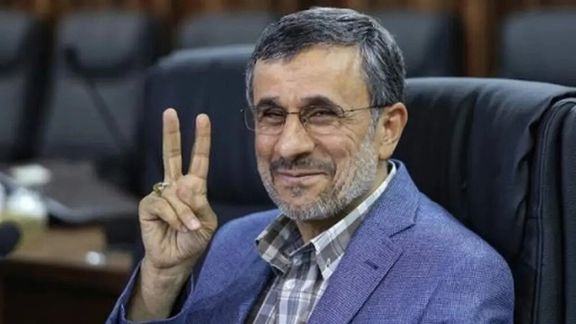
Dear reader, this item mistakenly was based on a video that unfortunately was old and we apologize for the error. However, we will not delete the item for now.

Dear reader, this item mistakenly was based on a video that unfortunately was old and we apologize for the error. However, we will not delete the item for now.
-----------------------------------------------------------------------------------------------------------------------------
Iran’s former President Mahmoud Ahmadinejad, who had kept silent during the recent anti-regime protests, has finally criticized the crackdown on protesters.
In a video published, Ahmadinejad said “the money spent on suppressing people should be spent on solving the country's problems.”
He also mentioned that claims by “corrupt gangs” of security and intelligence organs, who only want to “bug” people, are not valid because it is not possible to label everyone “anti-regime”.
Elsewhere in his remarks, he called on Islamic Republic officials to listen to people’s demands and solve their problems, saying otherwise “we may not have a chance to make up for it tomorrow.”
Mahmoud Ahmadinejad was conspicuously nowhere to be seen within the past four months as Iran was experiencing its biggest uprising in more than four decades.
The camera-loving populist politician fell out with Supreme Leader Ali Khamenei in May 2011 over firing the leader's favorite intelligence Minister Heidar Moslehi, and even refused to go to work for a couple of weeks.
Since 2017, Ahmadinejad has often been critical of the regime and spoken about change. He has separated himself from the government as much as he possibly could, but lack of a large grassroot support left him isolated.
With his background, it is unlikely that the youngsters, who have taken to the streets, would see him or his vaguely defined populist plans as part of the bigger picture they have in mind for Iran's future.
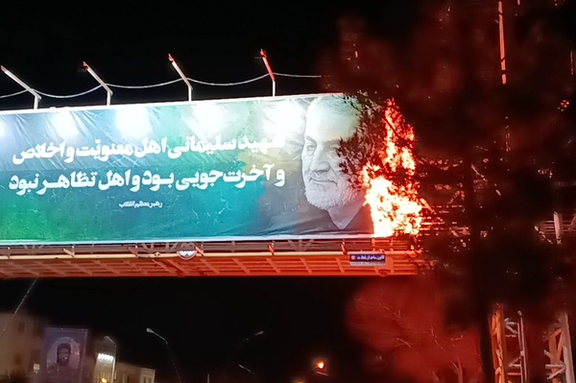
On the third death anniversary of ex-IRGC commander Qassem Soleimani’s death, people in different parts of Iran burned his statues and posters, including in his hometown.
Videos received by Iran International show people setting fire to Soleimani’s banners and posters in Tehran, Karaj, Zarinshahr, Rafsanjan, and his hometown Kerman.
The Islamic Republic through its propaganda tries to show Soleimani as a national hero, but many people believe he was guilty of war crimes against civilians in Syria and spreading violence in the region.
On January 3, 2020, the US military, on the order of President Donald Trump, killed Soleimani in a drone strike near Baghdad International Airport, saying that he had been "actively developing plans to attack American diplomats and service members in Iraq and throughout the region."
In a Monday statement, the Iranian regime claimed that Washington conducted the killing of Soleimani with "false claims and pretexts, including under the guise of counter-terrorism" and in "naked violation of the tenets and principles of international law."
Iranian Foreign Minister Hossein Amir-Abdollahian said on Sunday that nearly 60 US officials have been blacklisted by Tehran for their involvement in the assassination of Soleimani.
The US State Department told Iran International that Washington protects its citizens against possible retaliatory measures by the Islamic Republic.
At the same time, global efforts are underway to place the Revolutionary Guards in the list of terrorist organizations. The UK and Germany are set to announce the designation of the IRGC in the near future.
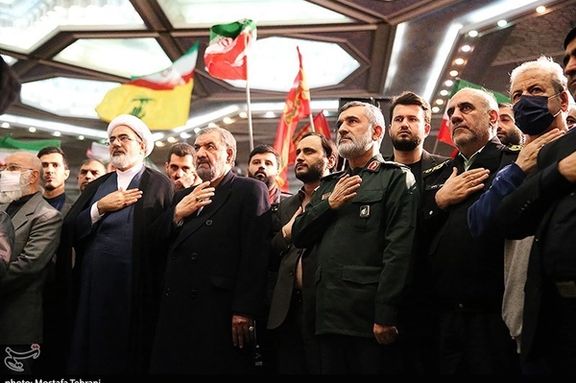
The Iranian Foreign Ministry says the US killing Qassem Soleimani. former commander of IRGC's Quds Force in 2020 failed in bringing Washington its desired outcome.
In a tweet on Tuesday, the foreign ministry claimed Iran continues “to play a decisive role” in the region and the United States’ “footprint in West Asia continues to diminish”.
The tweet was published on the eve of the third anniversary of Soleimani’s killing by the United States.
On January 3, 2020, the US military, on the order of President Donald Trump, killed Soleimani in a drone strike near Baghdad International Airport, saying that he had been "actively developing plans to attack American diplomats and service members in Iraq and throughout the region."
In a Monday statement, the Iranian regime also claimed that Washington conducted the killing of Soleimani with "false claims and pretexts, including under the guise of counter-terrorism" and in "naked violation of the tenets and principles of international law."
Iranian Foreign Minister Hossein Amir-Abdollahian said on Sunday that nearly 60 US officials have been blacklisted by Tehran for their involvement in the assassination of Soleimani.
Iran’s President Ebrahim Raisi and Supreme Leader Ali Khamenei have time and again vowed revenge for the killing of Soleimani.
Raisi in a speech on Tuesday addressed the US saying, “We have not forgotten martyr Soleimani’s blood and will never forget. They [Americans] should know that revenge for Soleimani is certain and his killers…will not have any peaceful sleep.”
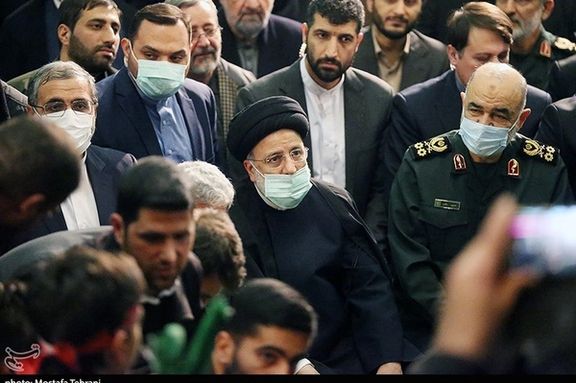
At the same time, many Iranian regime opponents and activists on social media celebrated Soleimani’s killing anniversary, calling it a “Cutlet Day”, after a popular Iranian dish made of ground beef and potatoes. Soleimani’s body was so mutilated in the attack that his detractors came up with the comparison to the meat and potato patties.
Some activists said that if Soleimani was alive he would have ordered a more brutal response to the current protests and would have had no reservations about killing thousands of people. They accused him of playing such a role in past protests and engineering Iran’s bloody military intervention in Syria against anti-Assad rebels, when hundreds of thousands of people were killed, injured and left homeless.
Protesters in Iran burned many banners erected in Soleimani’s honor this week and set fire to several of his statues.
A member of Iranian Revolutionary Guard was charged in August with planning to assassinate John Bolton, the former United States National Security Advisor in what the US Justice Department called “retaliation for the death of Iran’s Islamic Qasem Soleimani”.
Former Secretary of State Mike Pompeo was also told by the Justice Department that he was a second target of the plot.
Soleimani, who was Iran’s top military and intelligence operator outside its borders, was in charge of supporting and organizing militant proxy forces, including the Lebanese Hezbollah and Iraqi Shiite militia groups that have repeatedly attacked US forces.
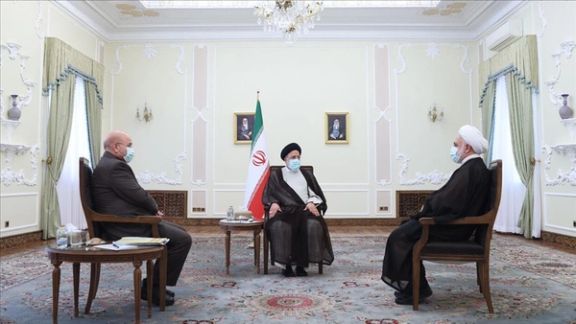
Some Iranian politicians suggest that early elections can be an option on the table as a way out of the economic crisis that has made life difficult for millions.
The far-reaching solution assumes that current ultraconservative parliament and President are incapable of tackling the problem mainly because of their weakness in the areas of economy and foreign policy.
A report in the centrist Aftab News in Tehran says that the overwhelmingly ultraconservative parliament (Majles) does not represent the entire nation. The report claimed that the only representative parliament in post-1979 Iran was formed in 1980 when the Guardian Council had not started its "discretionary supervision" of elections in Iran. The report further opined that returning to that form of parliament could be one of the most important ways out of Iran's political impasse.
Probing into the impact of a parliament which is predominantly radical and ultraconservative, the paper claimed that the elimination of other political factions from the election process has pushed the people into the streets to protest.
This was referring to the parliamentary election in 2020 and the presidential vote in June 2021, when most ‘reformist’ or even centrist insiders were barred from running.
But the protesters on the street do not care about reformists returning to the government. They unequivocally demand a regime change and a democratic, secular state.
Another issue is whether elections can help the country change course when all major decisions are made by Supreme Leader Ali Khamenei, including vetting of candidates prior to a vote. This is exactly what happened in 2020 and 2021 when the Guardian Council appointed by Khamenei barred hundreds of candidates.

Speaking about the role of President Ebrahim Raisi's administration in the political impasse, former reformist lawmaker Mohammad Ali Vakili said having seen the Raisi administration's performance so far, "it is highly unlikely that he could solve Iran's economic crisis. The members of his government have been talking too much about the problems, bragging about their solutions, but so far we have not seen anything other than ineffective speeches."
‘Reformist’ politician Jalal Jalalizadeh pointed out in an interview with Aftab News: "The government's inefficient structure is the main part of the problem and reforming it is one of the major demands of the nation." He added that "The Majles has almost no role in solving the country's most important problems."
Therefore, Jalalizadeh suggested, "It is essential that the government sets up a committee to probe into the current protests and try to meet the protesters' demands." He added: "If the government does not like the idea of changing the Constitution, it can consider early Majles and presidential elections in a bid to get rid of the current parliament and administration, which cannot fulfil their promises and have failed to respond to the people's demands."
However, he warned that Iran's reformists should not seize the opportunity of an early election to take over the government and the parliament only to serve their own financial interests and political ambitions.
This is not the first time Iranian politicians put forward the idea of early elections. Last month, some media proposed early presidential elections to make the revival of the JCPOA possible, as the Raisi administration has failed to reach an agreement with the West.
Also in July 2022, reformist commentator Abbas Abdi repeated what he had suggested to former President Hassan Rouhani about holding an early election in 2021 when hardliners tied his hands in the nuclear talks.
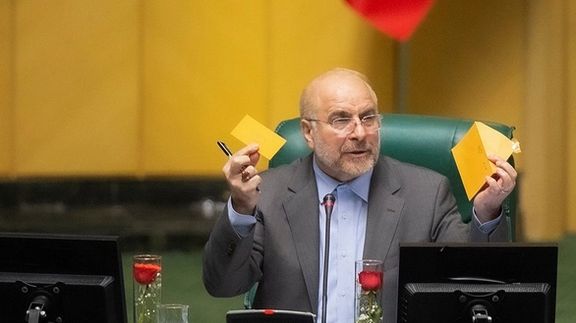
As most Iranian officials, hardliner clerics and military commanders are adamant to suppress the ongoing protests, a few figures suggest alternative approaches.
The Speaker of Iranian parliament Mohammad Bagher Ghalibaf who had earlier introduced the idea of "a new form of governance," told reporters in Tehran January 1 that he is trying to reach a consensus among Iran's top officials to make changes in the system of governance in the Islamic Republic.
Ghalibaf added that economic issues are the top priorities in these meeting, while the current anti-regime protests are more about social and political liberties and establishing a democratic, secular political system than any economic demand.
This comes while, he has been paying visits to security forces to pay tribute to them for dealing with the protests. On the other hand, the latest photos of Iran's top officials showed Ghalibaf in his regular weekly meeting with President Ebrahim Raisi and Judiciary Chief Gholamhossein Mohseni Ejei and Vice President Mohammad Mokhber who took part in the weekly meeting for the first time. The photo shows Mokhber, a confidant of Supreme Leader Ali Khamenei, addressing the three top officials.
This could pretty much be one of those meetings in which Ghalibaf says he has been looking for a consensus about how to deal with the protests.
Ghalibaf had also met with some of Iran's top clerics last week when nearly all of those who "received" him criticized Raisi's economic policies and his government's inefficiency.
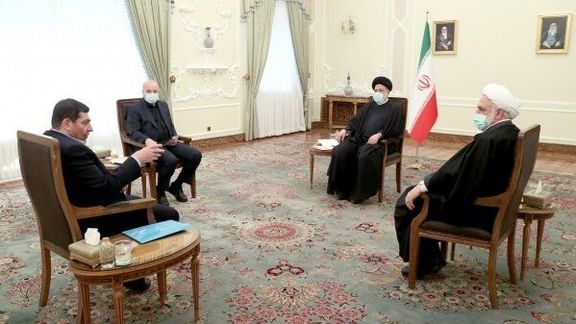
Despite the attractive rhetoric about "a new form of governance," Ghalibaf explanation about the idea leaves no room for unnecessary excitement. He said that "I believe the renovation of the system of governance should take place based on the ideas of Ruhollah Khomeini and Ali Khamenei."
Meanwhile, Ghalibaf praised Raisi for replacing the governor of the Central Bank and said he hopes the new governor would offer a solution for the falling Iranian currency rial, which has dipped to unprecedented lows since September.
In another development, a seasoned intelligence operative, former government spokesman Ali Rabiei has called for reforms in Iran, adding that "This is the best time to start reforms. Tomorrow might be too late."
Claiming that street protests have receded, Rabiei reiterated that this is the right time to send signals about reforms and to introduce new social policies. He said what prompted him to come up with the idea of quick reforms were the street protests, which he said are the result of economic difficulties and lost hopes in the future. He also mentioned the blow dealt against Iran by Chinese President Xi Jinping during his Middle east tour, which he said was inspired by Iran's internal crisis.
Rabiei added that the government should take lessons from these experiences and not repeat wrong domestic and foreign policies. He said wrong assumptions about international and regional developments has cost Iran many missed opportunities during the past four decades.
He also reminded top officials that resorting to reforms does not necessarily mean a retreat from previously declared policies.
An article along the same lines on the proreform Fararu website formulated the same by stating that the regime might not survive if it ignores the three crises of polarization in the society, the threat of hyper-inflation and the impact of regional and international isolation, adding that the government should find solutions for these three crises as soon as possible before it is too late.
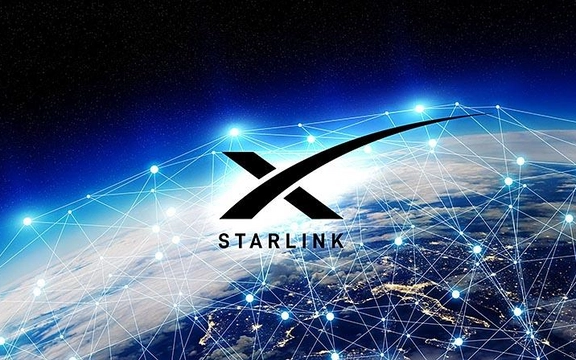
An Iranian official has said that around 800 Starlink satellite internet receivers have been imported to Iran, saying the technology would be used more in future.
Head of the Tehran Telecom Traders Union Mehdi Mohebi quoted an “official” who did not want to reveal his identity that 800 Starlink satellite internet terminals have entered the country so far.
This comes as the American tycoon Elon Musk said last week that the use of satellite internet services in Iran has increased and around 100 Starlink devices are active in the country now.
Musk said in a tweet that “approaching 100 Starlinks active in Iran”, three months after he confirmed he would activate the service in the country to help Iranians circumvent internet restrictions imposed by the government amid nationwide protests.
Back in September the billionaire, who is now also a social media player by controlling Twitter, had announced he would activate Starlink in Iran as part of the United States’ effort “to advance internet freedom” and facilitate “the free flow of information” to Iranians.
The Iranian regime has been severely restricting Internet access in general and access to popular social media platforms, such as Instagram, in particular that play a key role in protester communications. These restrictions have caused many problems for those who rely on social media to promote their businesses and hugely damaged e-commerce.
It is not clear who are the importers of the receivers, which the government views as illegal. Most likely, the devices are brought from across the borders by small-time smugglers.